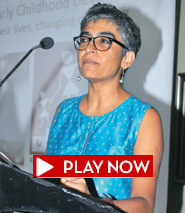
Rotarians learn about child development and disabilities
Dr. Vibha Krishnamurthy
 Dr. Vibha Krishnamurthy has trained in Developmental Paediatrics at Children’s Hospital, Boston. She founded Ummeed Child Development Center in 2001 and is currently the Executive Director. She has 15 years of experience in India as a developmental paediatrician and serves on expert committees related to Early Childhood Development and disability for the WHO and Government of India. Ummeed was set up with the objective of helping children with developmental disabilities such as cerebral palsy, mental retardation, learning disability, autism and attention deficit disorder.
Dr. Vibha Krishnamurthy has trained in Developmental Paediatrics at Children’s Hospital, Boston. She founded Ummeed Child Development Center in 2001 and is currently the Executive Director. She has 15 years of experience in India as a developmental paediatrician and serves on expert committees related to Early Childhood Development and disability for the WHO and Government of India. Ummeed was set up with the objective of helping children with developmental disabilities such as cerebral palsy, mental retardation, learning disability, autism and attention deficit disorder.
Dr. Krishnamurthy expressed her pleasure at being invited by the Club and at seeing many familiar faces in the audience. She said, “I will begin by saying that my talk is not going to be just about disabilities; although child development and disability is my main area of focus, I want to place disability in the context of Early Childhood Development in general here today. When I talk about disabilities, I see that only a few people are interested in the subject and those are the ones with a personal connect to the issue and the others who have had no experience with it believe that it does not concern them. However, I hope that by the end of this talk, I can convince all of you that each and every one of us is deeply affected by child development and disabilities. So I am going to tell you Amol’s story, which is his real name and he has given his consent for this story to be told. Amol’s father is a police constable working in Nanded and he lives with his wife, Amol and his sister. Even before Amol was born, it was decided that he was going to be the future breadwinner of the family and work at a position much higher than that of his father. Amol however, was born with hyper-thyroidism that went undetected till he was 10 months old. Those of you in the medical field know how much the thyroid hormone affects brain development. Today, Amol takes his supplements and comes to see me but he is a slow learner. His father’s question to me the last time I met him was what kind of a job I thought Amol would get.”
She then discussed where the workforce pipeline for people with disabilities begin. “One option would be livelihood training and lots of wonderful NGOs do that today, but, perhaps, we should begin a little earlier, at learning institutions starting from a good school. Everybody talks about how we need to invest in school kids today to ensure a vibrant workforce for the future.
“Ninety per cent of your brain has developed by the time you are three years old and the rate at which the brain acquires neuronal connections in these first three years is unmatched in the rest of your life. You are going to keep learning well into your 60s and 70s, but the fact is that the maximum return on investment you get is when you invest in a rapidly growing brain in the first three years of your life. So the difference you make in a child’s life by investing early is dramatic. It often misleads people into thinking this implies that you need to cram as much knowledge as possible into a child’s brain in those three years but the fact of the matter is brains are not sponges. In fact, a child’s brain could not be less like a sponge. Much like a tennis match, a child’s brain works on a serve and response basis. What you serve, the child picks up and responds to in the same manner. This is what we need to remember when we are investing in Early Childhood Development,” she explained.
